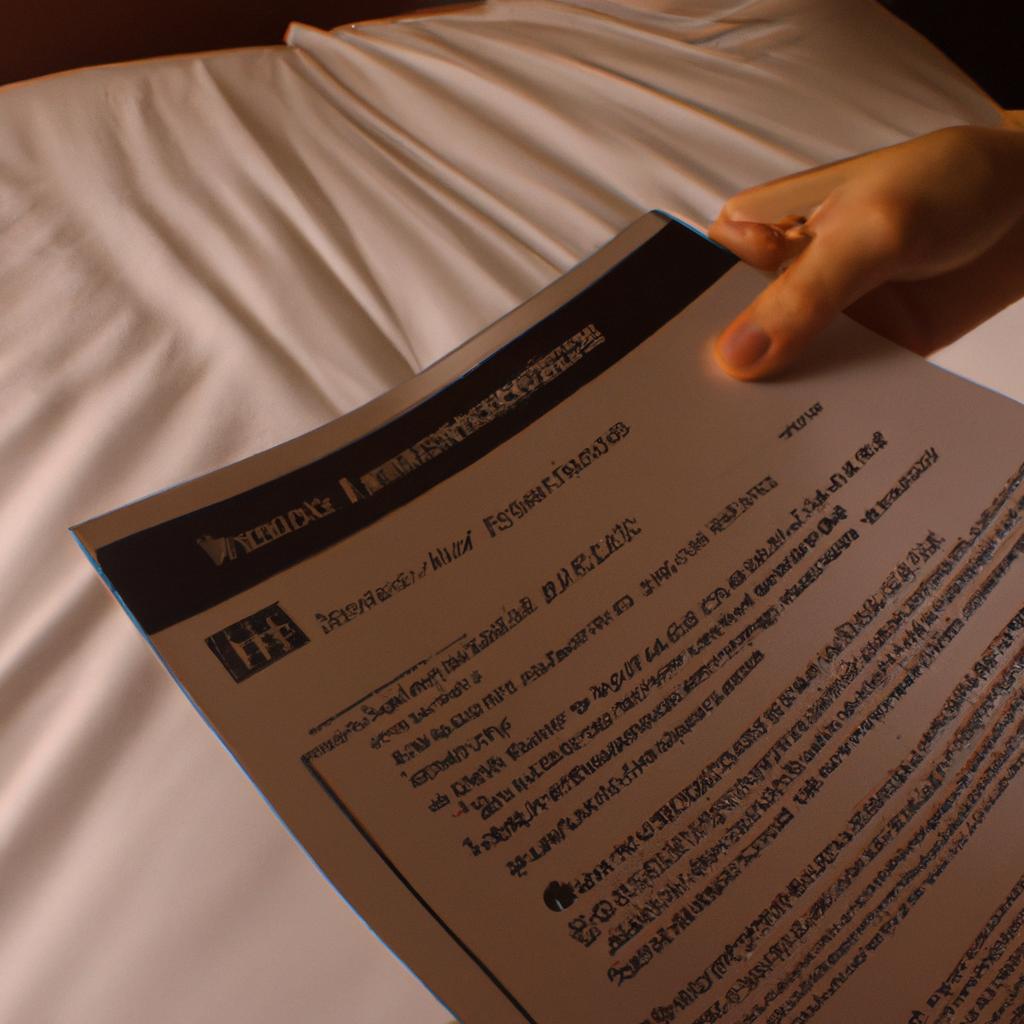Hotels are an essential part of the travel experience, providing accommodation and comfort to weary travelers. However, navigating hotel cancellation policies can often be a complex and confusing task for guests. Understanding these policies is crucial, as they dictate whether or not guests will incur charges if they decide to check out early. For instance, imagine a hypothetical scenario where a business traveler needs to leave their hotel room earlier than expected due to an urgent work assignment. It becomes imperative for them to comprehend the specific cancellation policy in order to avoid unnecessary financial penalties.
In this article, we will delve into the intricacies of hotel cancellation policies, shedding light on the factors that influence these policies and how they may vary from one establishment to another. By understanding these nuances, travelers can make informed decisions regarding their reservations, ensuring a hassle-free and cost-effective stay at hotels around the world. Furthermore, we will explore common types of cancellation policies employed by hotels, such as non-refundable rates and flexible rates with various deadlines for cancellations. Through this exploration, readers will gain insights into the rationale behind these policies and strategies for mitigating potential losses when faced with unexpected changes in travel plans.
Types of hotel cancellation policies
Types of Hotel Cancellation Policies
Imagine you have planned a vacation to a tropical paradise, but due to unforeseen circumstances, you need to cancel your hotel reservation. In such situations, understanding the types of hotel cancellation policies can help you navigate through potential penalties and make informed decisions.
Hotel cancellation policies vary widely across establishments, ranging from lenient to strict. The policy depends on factors like the type of booking (e.g., non-refundable or flexible), the timing of cancellation relative to check-in date, and the specific terms set by each hotel. To illustrate this diversity, let’s consider an example:
Case Study: Hotel X offers two distinct options for cancellations. For bookings made under their “Flexible Rate,” guests can cancel up until 24 hours before check-in without incurring any charges. However, if they fail to do so within this timeframe, they will be charged for one night’s stay. Conversely, for reservations made under their “Non-Refundable Rate,” no refunds are provided regardless of when the cancellation occurs.
Understanding these different policies is crucial as it allows travelers to plan accordingly and avoid unexpected financial consequences. Here are some common types of hotel cancellation policies that tourists may encounter:
- Flexible Cancellation Policy: This policy grants guests more flexibility by allowing them to cancel their reservation free-of-charge within a specified time frame before arrival.
- Partially Refundable Policy: Under this policy, hotels provide partial refunds based on the timing of cancellation relative to the check-in date.
- Non-Refundable Policy: As implied by its name, this policy does not offer any refund options regardless of when the guest decides to cancel.
- Strict Cancellation Policy: Some hotels enforce stricter rules where guests must cancel well in advance or face substantial penalties.
These varying policies aim to strike a balance between accommodating guests’ needs while protecting hotels’ revenue streams. To better understand how these policies impact travelers, let’s examine the following table:
| Hotel Cancellation Policy | Timing of Cancellation | Penalty |
|---|---|---|
| Flexible | Up to 24 hours before | No charges incurred |
| Partially Refundable | 24-48 hours before | 50% refund |
| Non-Refundable | Anytime | No refunds provided |
| Strict | More than 7 days prior | No charges incurred |
By analyzing this table, guests can gain a clearer understanding of the potential consequences associated with different cancellation policies.
Understanding the penalties for cancelling a hotel reservation allows travelers to make informed decisions when faced with unexpected circumstances. In the subsequent section, we will explore how these penalties are determined and offer insights into mitigating their impact on your travel plans.
Understanding the penalties for cancelling a hotel reservation
Understanding the penalties for cancelling a hotel reservation can be crucial when planning your travel arrangements. Hotel cancellation policies vary widely, and it is important to familiarize yourself with these policies before making a reservation. Let’s delve into the different types of penalties that hotels may impose in case of cancellation.
Consider this hypothetical scenario: You have booked a room at a luxurious beachfront resort for a week-long vacation. However, due to unforeseen circumstances, you need to cancel your reservation just two days before your intended stay. In such cases, most hotels typically charge a cancellation fee based on their policy. These fees vary depending on factors such as the type of room reserved, the length of notice given prior to cancellation, and the popularity of the hotel during that particular time period.
To give you an idea of what some common penalties might look like, here are four examples:
- Cancellation within 24 hours of check-in: A full night’s rate will be charged.
- Cancellation between 2-7 days before check-in: The hotel may charge a penalty equivalent to one or two nights’ stay.
- Cancellation between 8-14 days before check-in: A fee equal to 50% of the total cost may be imposed.
- Cancellation more than 14 days before check-in: Typically no penalty or only a nominal administrative fee would apply.
Here is an emotional bullet point list highlighting the potential consequences of not being aware of hotel cancellation policies:
- Financial loss from paying high cancellation fees
- Disappointment from missing out on desired accommodations
- Difficulty finding alternative accommodations at short notice
- Stress caused by last-minute changes to travel plans
Now let’s take a closer look at how these penalties can vary across different hotels by examining the following table:
| Hotel | Timeframe Before Check-In | Penalty |
|---|---|---|
| Resort A | Within 24 hours | Full night’s rate charge |
| Hotel B | 2-7 days | One or two nights’ stay penalty |
| Inn C | 8-14 days | Fee equal to 50% of total cost |
| Lodge D | More than 14 days | No penalty or nominal administrative fee |
Understanding the penalties for cancelling a hotel reservation is essential for making informed decisions. By familiarizing yourself with these policies, you can avoid unexpected financial burdens and ensure a smoother travel experience.
Moving forward, let’s explore the factors that affect hotel cancellation fees and how you can navigate them effectively.
Factors that affect hotel cancellation fees
Understanding the penalties for cancelling a hotel reservation can be crucial when planning your travel. Hotel cancellation policies vary widely, and it is important to familiarize yourself with them before making any reservations. Let’s explore some key factors that affect these fees and understand why they are in place.
Consider the following scenario: You have booked a room at a popular beachfront resort for a week-long vacation. Unfortunately, an unexpected family emergency arises, forcing you to cancel your plans just three days before your scheduled arrival. The resort has a strict cancellation policy that states cancellations made within 72 hours of check-in will incur a penalty equal to one night’s stay.
One factor that affects hotel cancellation fees is timing. Hotels often implement stricter policies for last-minute cancellations due to their reduced ability to fill the vacant rooms on short notice. By charging fees for late cancellations, hotels aim to minimize revenue loss caused by empty rooms.
Additionally, hotels may consider demand during specific periods or events as another determining factor for their cancellation policies. For example, during peak tourist seasons or major conventions held in the area, hotels might impose higher penalties for cancellations since alternative accommodations may be limited or more expensive.
To further illustrate the potential impact of hotel cancellation fees, let us examine a hypothetical situation involving four different travelers:
- Traveler A cancels two weeks prior to check-in and incurs no fee.
- Traveler B cancels five days prior to check-in and pays a fee equivalent to one night’s stay.
- Traveler C cancels less than 48 hours before check-in and is charged 50% of the total booking cost.
- Traveler D fails to show up without notifying the hotel in advance and is charged the full amount of their intended stay.
The emotional response from such scenarios can range from relief (in case of early cancellations) to frustration or even financial burden (in case of last-minute cancellations). To better understand the potential impact of hotel cancellation fees, consider the following table:
| Traveler | Cancellation Time | Fee |
|---|---|---|
| A | 2 weeks prior | No fee |
| B | 5 days prior | One night’s stay |
| C | Less than 48 hours | 50% of total booking cost |
| D | No show | Full amount |
As travelers, it is essential to be aware of these policies and plan accordingly. In the subsequent section on “How to avoid hotel cancellation fees,” we will explore strategies that can help mitigate or eliminate such charges altogether.
Now let us delve into effective ways to minimize hotel cancellation fees without compromising your travel plans.
How to avoid hotel cancellation fees
Understanding Hotel Cancellation Policies: Factors to Consider
Imagine this scenario: You have booked a hotel room for your upcoming vacation, but due to unforeseen circumstances, you need to cancel your reservation. As you reach out to the hotel to inquire about their cancellation policy, you realize that there are several factors that can affect the fees associated with cancelling your booking.
Factors such as the timing of your cancellation and the type of rate you chose when booking can significantly impact the amount you will be charged. Let’s take a closer look at these factors:
-
Timing of Cancellation:
- Early cancellation: Some hotels offer flexible cancellation policies if you notify them well in advance. This usually allows guests to cancel without any penalty or receive a full refund.
- Last-minute cancellation: If you cancel close to your check-in date or fail to show up, hotels often charge a fee equivalent to one night’s stay or even the entire cost of your reservation.
-
Rate Type:
- Non-refundable rates: These rates typically offer lower prices but come with more stringent cancellation policies. In most cases, if you cancel a non-refundable reservation, you may not receive any refund.
- Refundable rates: These rates provide more flexibility and allow cancellations without significant penalties. However, it is worth noting that some hotels might still impose a small fee for cancelling even refundable reservations.
To further illustrate how these factors can influence hotel cancellation fees, consider the following table:
| Booking Scenario | Timing of Cancellation | Rate Type | Fee Imposed |
|---|---|---|---|
| 1 | 14 days prior | Non-refundable | Full cost of reservation |
| 2 | 7 days prior | Refundable | No fee |
| 3 | 48 hours prior | Refundable | One night’s stay |
| 4 | On check-in date | Non-refundable | Full cost of reservation |
Understanding these factors and their potential impact on cancellation fees can help you make informed decisions when booking a hotel.
Tips for Navigating Hotel Cancellation Policies: Ensuring Smooth Transitions
As you plan your travels, it is essential to be well-prepared in case unforeseen circumstances require you to cancel or modify your hotel reservations. By following these suggestions, you can navigate hotel cancellation policies more effectively:
[ ] Research and compare cancellation policies before making any bookings.[ ] Opt for refundable rates if you anticipate potential changes in your travel plans.
[ ] Consider purchasing travel insurance that covers trip cancellations or interruptions.
[ ] Communicate directly with the hotel if you need to modify or cancel your reservation, as they might offer more flexibility than third-party booking platforms.
By being proactive and familiarizing yourself with the specific terms and conditions associated with each hotel’s cancellation policy, you can ensure a smoother experience should unexpected changes arise during your travel journey.
In the subsequent section, we will explore strategies for securing refunds or minimizing cancellation fees through effective communication with hotels.
Tips for navigating hotel cancellation policies
Understanding hotel cancellation policies is crucial for travelers who want to avoid unnecessary fees and complications. In this section, we will explore some tips for navigating these policies effectively.
To illustrate the importance of understanding hotel cancellation policies, let’s consider a hypothetical scenario: Sarah plans a vacation and books a hotel room well in advance. However, due to unforeseen circumstances, she needs to cancel her reservation just a week before her scheduled arrival date. Without being aware of the hotel’s cancellation policy, Sarah finds herself facing hefty cancellation fees that could have been avoided with proper knowledge.
One effective way to navigate hotel cancellation policies is by familiarizing yourself with the terms and conditions outlined during the booking process. These terms often include information about deadlines for cancellations without penalties and any associated fees. By paying attention to these details upfront, you can make informed decisions regarding your reservations.
Here are some key points to keep in mind when dealing with hotel cancellation policies:
- Cancellation Deadlines: Be aware of specific deadlines set by hotels for free cancellations or modifications. Missing these deadlines may result in financial consequences.
- Flexible Rates vs. Non-refundable Rates: Consider opting for flexible rates if there is uncertainty surrounding your travel plans. While non-refundable rates might offer lower prices initially, they often come with stricter cancellation policies.
- Consider Travel Insurance: Evaluate whether purchasing travel insurance would be beneficial for your situation. Some policies cover unexpected events leading to trip cancellations or changes.
- Communication with Hotels: If you encounter an unavoidable circumstance that requires cancelling or modifying your reservation outside the permitted timeframe, it can be helpful to communicate directly with the hotel staff. They may show flexibility or provide alternative solutions.
In summary, understanding how hotel cancellation policies work can save you from potential financial setbacks caused by last-minute changes or unforeseen circumstances. Taking note of important details during the booking process and considering factors like flexible rates and travel insurance can further enhance your ability to navigate these policies effectively.
The importance of reviewing hotel cancellation policies before booking
Understanding hotel cancellation policies is crucial for travelers who may need to change or cancel their plans. One case study that highlights the importance of being aware of these policies involves a couple planning a romantic getaway. They book a luxurious resort but unfortunately receive news that they have to attend an urgent family event on the same dates. Unaware of the hotel’s cancellation policy, they assume it will be flexible and allow them to modify their stay without any penalties. However, upon contacting the hotel, they discover that their booking was non-refundable and cannot be changed.
To navigate hotel cancellation policies effectively, consider the following tips:
- Read the fine print: Take the time to carefully review the terms and conditions before making a reservation. Look for information regarding cancellations, modifications, and refunds.
- Understand different types of rates: Hotels often offer various rate options such as non-refundable rates, advance purchase rates, and flexible rates. Each type has its own specific cancellation policy, so make sure you choose one that aligns with your travel plans.
- Pay attention to cancellation deadlines: Many hotels impose specific deadlines by which you must cancel in order to avoid fees or penalties. Missing these deadlines can result in charges equivalent to one night’s stay or even the full cost of your reservation.
- Consider travel insurance: If flexibility is important to you or if unforeseen circumstances are likely during your trip, purchasing travel insurance can provide peace of mind and financial protection against unexpected cancellations.
The table below outlines common hotel cancellation policies:
| Type of Rate | Cancellation Policy | Refund Eligibility |
|---|---|---|
| Non-Refundable | No refund for cancellations | No |
| Flexible | Free cancellation up until X hours/days before arrival | Yes |
| Advance Purchase | No refund for cancellations; payment upfront | No (unless specified) |
| Partially refundable | Refund available for cancellations within X hours/days before arrival | Yes (partial or full, depending on terms) |
Understanding hotel cancellation policies is essential to avoid unexpected costs and frustrations. By taking the time to review the fine print, understanding different rate options, being aware of cancellation deadlines, and considering travel insurance, you can make more informed decisions when booking accommodations.
Overall, travelers should always be proactive in familiarizing themselves with these policies as they vary from one hotel to another. This knowledge empowers individuals to plan their trips effectively and minimize any potential financial risks associated with changes or cancellations.
 Cedars Inn Auburn
Cedars Inn Auburn



